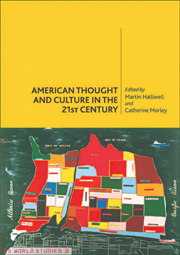Book contents
- Frontmatter
- Contents
- Acknowledgements
- Notes on the Contributors
- Introduction: The Next American Century?
- PART 1 POLITICS
- 1 American Politics in the 1990s and 2000s
- 2 American Leadership into the New Century
- 3 9/11 and US Foreign Policy
- 4 Three Variations on American Liberalism
- 5 The Rise of Postmodern Conservatism
- 6 US Propaganda
- PART 2 SOCIETY
- PART 3 CULTURE
- Bibliography
- Index
5 - The Rise of Postmodern Conservatism
from PART 1 - POLITICS
Published online by Cambridge University Press: 05 August 2013
- Frontmatter
- Contents
- Acknowledgements
- Notes on the Contributors
- Introduction: The Next American Century?
- PART 1 POLITICS
- 1 American Politics in the 1990s and 2000s
- 2 American Leadership into the New Century
- 3 9/11 and US Foreign Policy
- 4 Three Variations on American Liberalism
- 5 The Rise of Postmodern Conservatism
- 6 US Propaganda
- PART 2 SOCIETY
- PART 3 CULTURE
- Bibliography
- Index
Summary
If an American talks about contemporary politics with a citizen of the European Union, the term neoconservatism will likely come up. This is not the neoconservatism of the 1970s, when the term originated, but the neoconservatism that propelled George W. Bush's decision to invade Iraq. It suggests a conservatism that draws from Leo Strauss and emphasises America's role in spreading democracy abroad; a conservatism of grand universals willing to embrace the nasty practice of war; a conservatism that hopes to make democratic omelettes by breaking caseloads of eggs. This type of conservatism is important and has been discussed widely elsewhere, symbolising a new and, for obvious reasons, important constellation of ideas in American life.
It is also likely that our make-believe EU citizen will have heard of the ‘culture wars’ – the idea that Americans are divided between red and blue, between NASCAR fans and latte drinkers, between traditionalists and modernists. What is not so recognised is just how much these culture wars have transformed the intellectual landscape of America, especially the broad contours of conservative intellectual life today. With the recent critical interest on the neoconservatism of the Bush administration it is easy to overlook what I will call in the essay ‘postmodern conservatism’, a type of conservatism that relates directly to the rise of the culture wars during the 1980s and 1990s.
- Type
- Chapter
- Information
- American Thought and Culture in the 21st Century , pp. 81 - 96Publisher: Edinburgh University PressPrint publication year: 2008



